译林英语必修3Unit3 Back to the past Project (共40张PPT)
文档属性
| 名称 | 译林英语必修3Unit3 Back to the past Project (共40张PPT) |  | |
| 格式 | zip | ||
| 文件大小 | 3.1MB | ||
| 资源类型 | 教案 | ||
| 版本资源 | 牛津译林版 | ||
| 科目 | 英语 | ||
| 更新时间 | 2020-03-29 12:00:55 | ||
图片预览

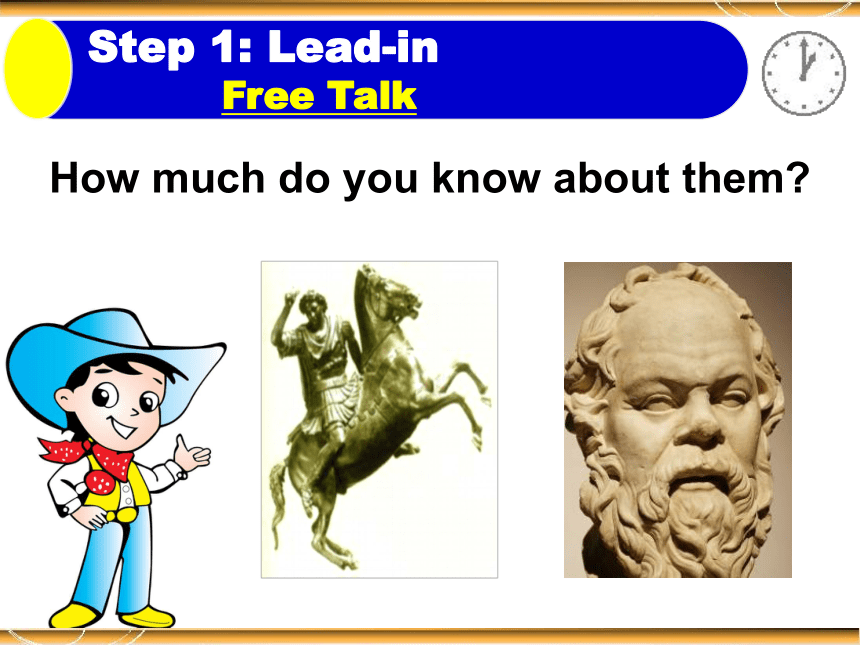




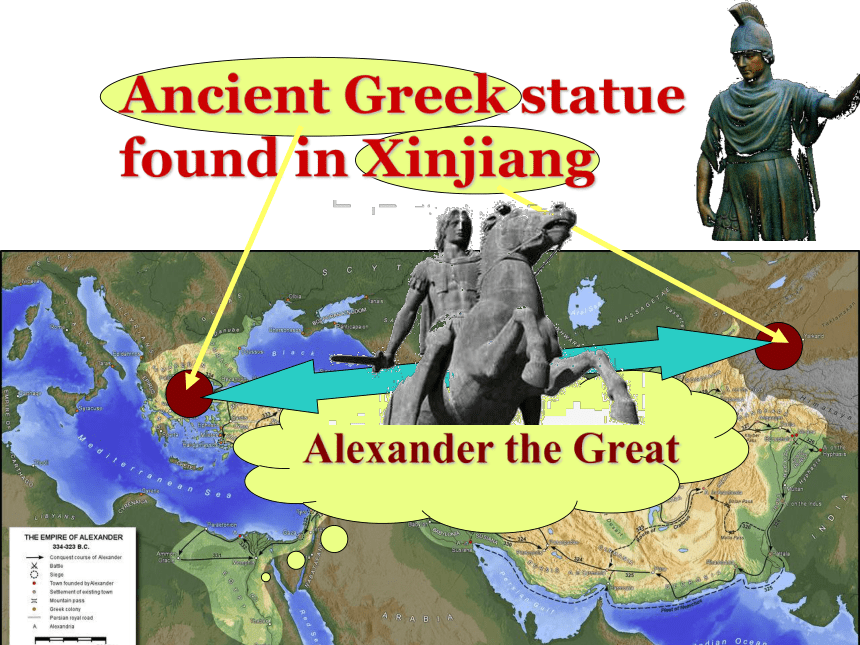

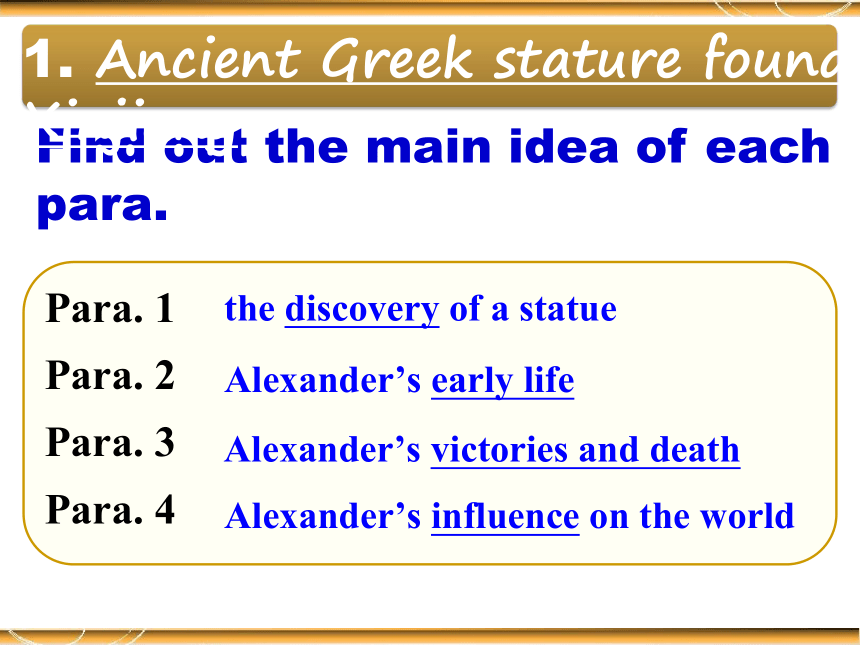
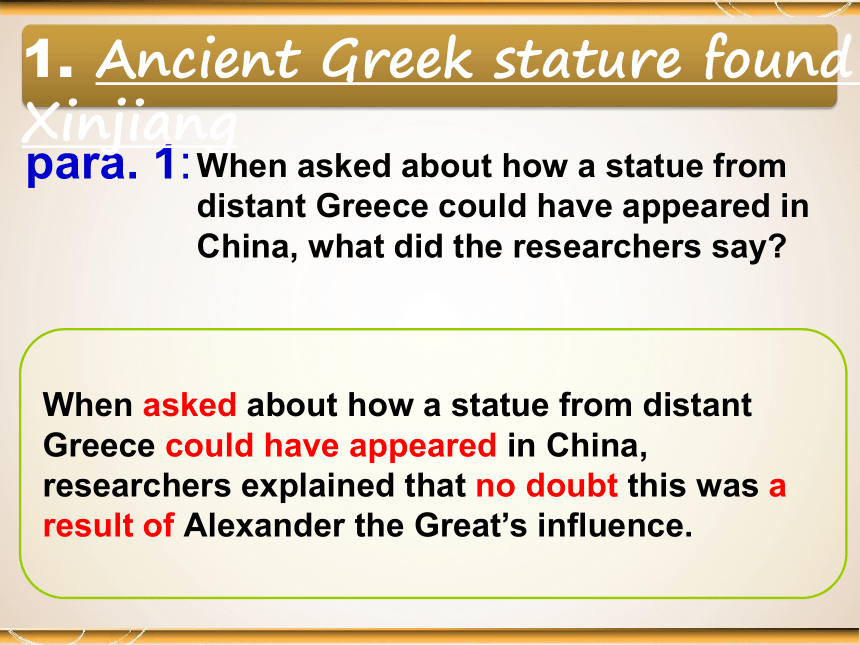
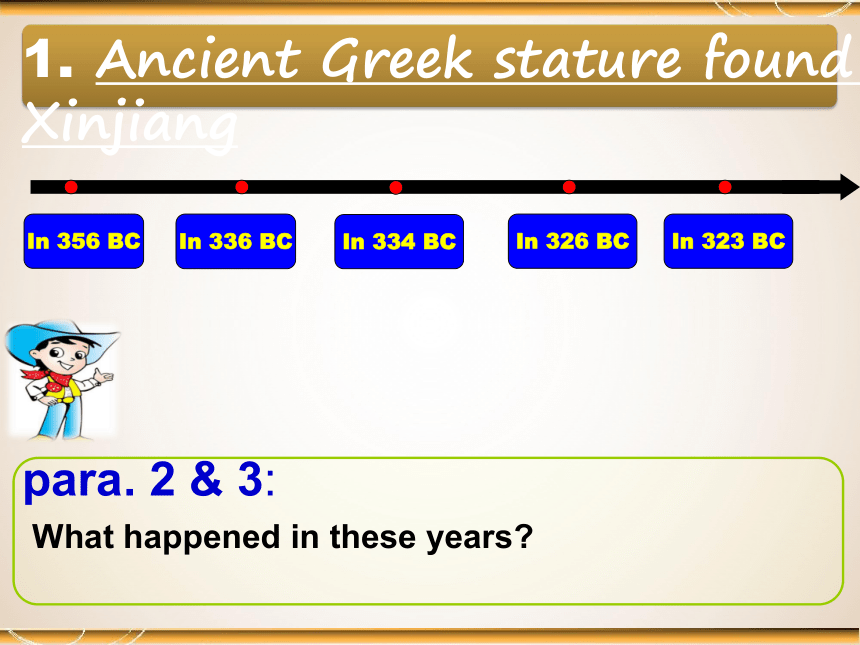
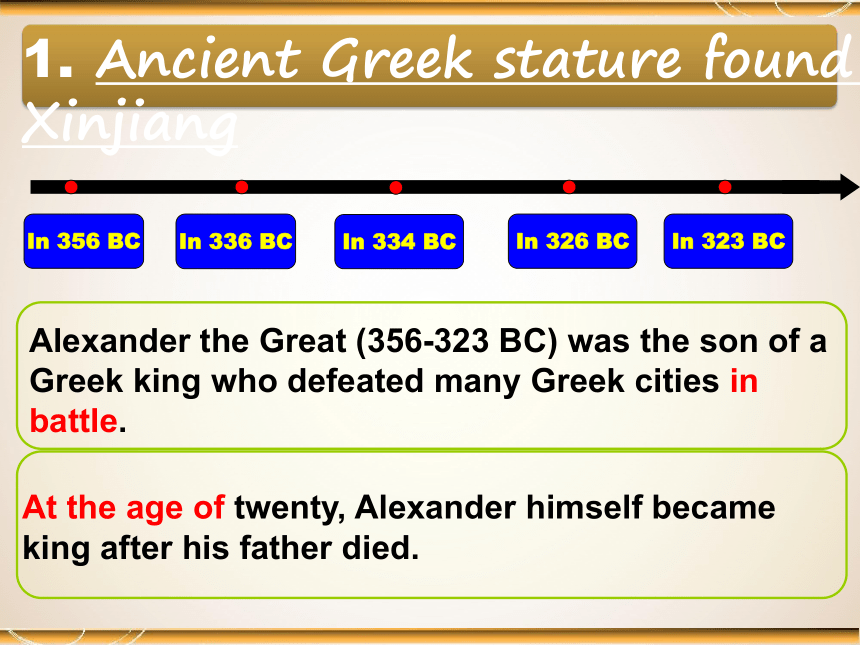
文档简介
(共40张PPT)
Module 3 Unit 3 Back to the past
Project: A historical figure
Step 1: Lead-in
Free Talk
How much do you know about them?
Step 1: Lead-in
Free Talk
Quotations
I am not afraid of an army of lions led by a sheep; I am afraid of an army of sheep led by a lion.
The unexamined life is not worth living.
The only good is knowledge and the only evil is ignorance.
Step 2: While-reading
Describe a Historical Figure
1.
2.
3.
Ancient Greek statue found in Xinjiang
The father of Western philosophy
Title
Step 2: While-reading
Describe a Historical Figure
free talk
Useful expressions
skim
scan
Alexander the Great
Is this article about an ancient Greek statue?
Free Talk
Alexander the Great
Ancient Greek statue found in Xinjiang
Alexander the Great
How much do you know about him?
Free Talk
Alexander the Great
356-323 BC
The son of a Greek King
Spread the Greek culture
Find out the main idea of each para.
1. Ancient Greek stature found in Xinjiang
Para. 1
Para. 2
Para. 3
Para. 4
the discovery of a statue
Alexander’s early life
Alexander’s victories and death
Alexander’s influence on the world
para. 1:
1. Ancient Greek stature found in Xinjiang
When asked about how a statue from distant Greece could have appeared in China, what did the researchers say?
When asked about how a statue from distant Greece could have appeared in China, researchers explained that no doubt this was a result of Alexander the Great’s influence.
para. 2 & 3:
What happened in these years?
1. Ancient Greek stature found in Xinjiang
Alexander the Great (356-323 BC) was the son of a Greek king who defeated many Greek cities in battle.
1. Ancient Greek stature found in Xinjiang
At the age of twenty, Alexander himself became king after his father died.
In 334 BC, he took his army, now with 42000 men, into the Middle East and then Egypt, defeating every army that stood in his path.
1. Ancient Greek stature found in Xinjiang
Then, he turned his eyes east, and marched all the way to India, finding victories everywhere he went.
1. Ancient Greek stature found in Xinjiang
However, his own army grew tired of endless battles and refused to go any further, so he had to turn back.
334, BC
Middle East and Egypt
Then, India
336, BC Greece
1. Ancient Greek stature found in Xinjiang
By the age of thirty, he had already occupied more land than anyone before, and it seemed that more glory was waiting ahead of him.
Yet, in 323 BC, he came down with a fever and died.
1. Ancient Greek stature found in Xinjiang
die of a fever
para. 4:
1. Ancient Greek stature found in Xinjiang
When and why was the statue of the Greek soldier which was found in northern Xinjiang came to China?
Probably, the statue of the Greek soldier, found in northern Xinjiang, came to China in the 4th century as a result of trade.
Useful expressions
1. Ancient Greek stature found in Xinjiang
2. in battle
5. take back
3. at the age of
4. rise up against
1. no doubt
6. stand in one’s path
Useful expressions
1. Ancient Greek stature found in Xinjiang
8. take control of
9. grow tired of
7. stop sb. from doing
10. turn back
11. come down with
12. for centuries to come
How much do you know about him?
Free Talk
Socrates
469-399 BC
A Greek philosopher?
The father of western philosophy
Find out the main idea of each para.
2. The father of Western philosophy
Para. 1
Para. 2
Para. 3
Para. 4
the meaning of philosophy
brief introduction to Socrates
Socratic Method
reasons for Socrates’ death
para. 1:
2. The father of Western philosophy
How do you think of philosophy?
The word ‘philosophy’ itself means ‘love of wisdom’.
Philosophy can be thought of as a way of looking at the world around us, or of answering the great questions of life, such as ‘Why are we here?’ and ‘What is truth?’.
What happened in different time?
2. The father of Western philosophy
Later
Para 2:
The father of Western philosophy was Socrates (469-399 BC).
2. The father of Western philosophy
Later
Socrates was born in 469 BC in Athen, Greece.
When he was young, he was a brave soldier.
2. The father of Western philosophy
Later
Later, he became a teacher, but he taught for free and earned his salary from being a common worker
The father of Western philosophy was Socrates (469-399 BC).
2. The father of Western philosophy
Later
Socrates died in 399 BC.
para. 3:
2. The father of Western philosophy
How did Socrates teach?
Socrates taught by asking questions through which he challenged his students to develop and explain their own arguments.
para. 3:
2. The father of Western philosophy
How much do you know about the Socratic Method?
Socrates’ way of approaching the truth is now called the Socratic Method, which is the basis of modern philosophy and science.
para. 4:
2. The father of Western philosophy
Why did Socrates die?
Finally, some people had had enough of him, so they took him to court for questioning the existence of the Greek gods and for corrupting the young people of Athens.
tio
Because Socrates questioned too much and upset many people in Athen.
para. 4:
2. The father of Western philosophy
Why did Socrates die?
At his trial, he defended himself by asking his judges more questions.
tio
Finally, he was put to death by being forced to drink poison.
para. 4:
2. The father of Western philosophy
How do people think of him?
Socrates was thought of as the hero of all people who search for truth.
Useful expressions
2. The father of Western philosophy
2. for free
5. be aware of
3. aside from
4. have a deep influence on
1. be thought of as
6. have had enough of
Useful expressions
2. The father of Western philosophy
9. be put to death
7. be the basis of
8. take sb. to sp.
10. search for
Step 3: Post reading
Describe a Historical Figure
1.
3.
aspects
Background
Life
Influences
1) What should be included?
Achievements
Step 3: Post reading
Describe a Historical Figure
2) Compare & Contrast
figure
spread
Achievement
affected
battle
Death
of
Nationality
Step 3: Post reading
Describe a Historical Figure
2) Compare & Contrast
The historical 1.________ Alexander the Great
(356-323BC) Socrates
(469-399BC)
2.________ Greek Greek
Influence/
Effect Alexander 3.________
the Greek culture from Europe to Africa and Asia Socrates 4._________ Western thought and science.
5.________ He took control of many countries by 6._________ when he was a king. He created his own teaching method: Socratic
Method.
7.________ He died 8._________ a fever. He was forced to drink poison.
Similarity
Difference
Step 3: Post reading
Describe a Historical Figure
2) Compare & Contrast
The historical
1. figure Alexander the Great
(356-323BC) Socrates
(469-399BC)
9.____________ Both were important in history.They had great influence on the world.
10.___________ Alexander influenced on
culture, but Socrates influenced on
Western thought and science.
Step 4: Homework
1. Finish “Project: Language Points” in P107.
2. Finish “Project: Language Points” in P74-75. KeKeLian.
Module 3 Unit 3 Back to the past
Project: A historical figure
Step 1: Lead-in
Free Talk
How much do you know about them?
Step 1: Lead-in
Free Talk
Quotations
I am not afraid of an army of lions led by a sheep; I am afraid of an army of sheep led by a lion.
The unexamined life is not worth living.
The only good is knowledge and the only evil is ignorance.
Step 2: While-reading
Describe a Historical Figure
1.
2.
3.
Ancient Greek statue found in Xinjiang
The father of Western philosophy
Title
Step 2: While-reading
Describe a Historical Figure
free talk
Useful expressions
skim
scan
Alexander the Great
Is this article about an ancient Greek statue?
Free Talk
Alexander the Great
Ancient Greek statue found in Xinjiang
Alexander the Great
How much do you know about him?
Free Talk
Alexander the Great
356-323 BC
The son of a Greek King
Spread the Greek culture
Find out the main idea of each para.
1. Ancient Greek stature found in Xinjiang
Para. 1
Para. 2
Para. 3
Para. 4
the discovery of a statue
Alexander’s early life
Alexander’s victories and death
Alexander’s influence on the world
para. 1:
1. Ancient Greek stature found in Xinjiang
When asked about how a statue from distant Greece could have appeared in China, what did the researchers say?
When asked about how a statue from distant Greece could have appeared in China, researchers explained that no doubt this was a result of Alexander the Great’s influence.
para. 2 & 3:
What happened in these years?
1. Ancient Greek stature found in Xinjiang
Alexander the Great (356-323 BC) was the son of a Greek king who defeated many Greek cities in battle.
1. Ancient Greek stature found in Xinjiang
At the age of twenty, Alexander himself became king after his father died.
In 334 BC, he took his army, now with 42000 men, into the Middle East and then Egypt, defeating every army that stood in his path.
1. Ancient Greek stature found in Xinjiang
Then, he turned his eyes east, and marched all the way to India, finding victories everywhere he went.
1. Ancient Greek stature found in Xinjiang
However, his own army grew tired of endless battles and refused to go any further, so he had to turn back.
334, BC
Middle East and Egypt
Then, India
336, BC Greece
1. Ancient Greek stature found in Xinjiang
By the age of thirty, he had already occupied more land than anyone before, and it seemed that more glory was waiting ahead of him.
Yet, in 323 BC, he came down with a fever and died.
1. Ancient Greek stature found in Xinjiang
die of a fever
para. 4:
1. Ancient Greek stature found in Xinjiang
When and why was the statue of the Greek soldier which was found in northern Xinjiang came to China?
Probably, the statue of the Greek soldier, found in northern Xinjiang, came to China in the 4th century as a result of trade.
Useful expressions
1. Ancient Greek stature found in Xinjiang
2. in battle
5. take back
3. at the age of
4. rise up against
1. no doubt
6. stand in one’s path
Useful expressions
1. Ancient Greek stature found in Xinjiang
8. take control of
9. grow tired of
7. stop sb. from doing
10. turn back
11. come down with
12. for centuries to come
How much do you know about him?
Free Talk
Socrates
469-399 BC
A Greek philosopher?
The father of western philosophy
Find out the main idea of each para.
2. The father of Western philosophy
Para. 1
Para. 2
Para. 3
Para. 4
the meaning of philosophy
brief introduction to Socrates
Socratic Method
reasons for Socrates’ death
para. 1:
2. The father of Western philosophy
How do you think of philosophy?
The word ‘philosophy’ itself means ‘love of wisdom’.
Philosophy can be thought of as a way of looking at the world around us, or of answering the great questions of life, such as ‘Why are we here?’ and ‘What is truth?’.
What happened in different time?
2. The father of Western philosophy
Later
Para 2:
The father of Western philosophy was Socrates (469-399 BC).
2. The father of Western philosophy
Later
Socrates was born in 469 BC in Athen, Greece.
When he was young, he was a brave soldier.
2. The father of Western philosophy
Later
Later, he became a teacher, but he taught for free and earned his salary from being a common worker
The father of Western philosophy was Socrates (469-399 BC).
2. The father of Western philosophy
Later
Socrates died in 399 BC.
para. 3:
2. The father of Western philosophy
How did Socrates teach?
Socrates taught by asking questions through which he challenged his students to develop and explain their own arguments.
para. 3:
2. The father of Western philosophy
How much do you know about the Socratic Method?
Socrates’ way of approaching the truth is now called the Socratic Method, which is the basis of modern philosophy and science.
para. 4:
2. The father of Western philosophy
Why did Socrates die?
Finally, some people had had enough of him, so they took him to court for questioning the existence of the Greek gods and for corrupting the young people of Athens.
tio
Because Socrates questioned too much and upset many people in Athen.
para. 4:
2. The father of Western philosophy
Why did Socrates die?
At his trial, he defended himself by asking his judges more questions.
tio
Finally, he was put to death by being forced to drink poison.
para. 4:
2. The father of Western philosophy
How do people think of him?
Socrates was thought of as the hero of all people who search for truth.
Useful expressions
2. The father of Western philosophy
2. for free
5. be aware of
3. aside from
4. have a deep influence on
1. be thought of as
6. have had enough of
Useful expressions
2. The father of Western philosophy
9. be put to death
7. be the basis of
8. take sb. to sp.
10. search for
Step 3: Post reading
Describe a Historical Figure
1.
3.
aspects
Background
Life
Influences
1) What should be included?
Achievements
Step 3: Post reading
Describe a Historical Figure
2) Compare & Contrast
figure
spread
Achievement
affected
battle
Death
of
Nationality
Step 3: Post reading
Describe a Historical Figure
2) Compare & Contrast
The historical 1.________ Alexander the Great
(356-323BC) Socrates
(469-399BC)
2.________ Greek Greek
Influence/
Effect Alexander 3.________
the Greek culture from Europe to Africa and Asia Socrates 4._________ Western thought and science.
5.________ He took control of many countries by 6._________ when he was a king. He created his own teaching method: Socratic
Method.
7.________ He died 8._________ a fever. He was forced to drink poison.
Similarity
Difference
Step 3: Post reading
Describe a Historical Figure
2) Compare & Contrast
The historical
1. figure Alexander the Great
(356-323BC) Socrates
(469-399BC)
9.____________ Both were important in history.They had great influence on the world.
10.___________ Alexander influenced on
culture, but Socrates influenced on
Western thought and science.
Step 4: Homework
1. Finish “Project: Language Points” in P107.
2. Finish “Project: Language Points” in P74-75. KeKeLian.
